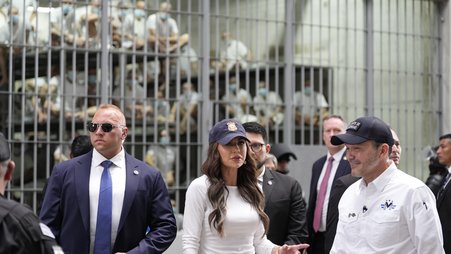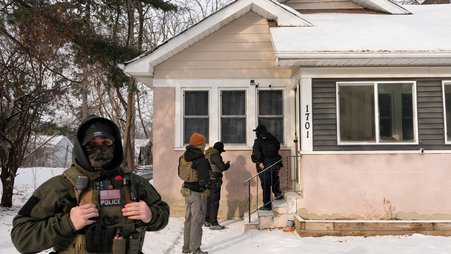
Freedom of the Press Foundation Executive Director Trevor Timm took this picture of Daniel Ellsberg speaking with Edward Snowden for the first time in September, 2013.
When our co-founder and legendary Pentagon Papers whistleblower Daniel Ellsberg passed away last week we wrote that “his long-term legacy may lie with the countless whistleblowers whom he inspired to follow in his footsteps.” But efforts are already underway to lionize him at the expense of 21st century whistleblowers.
Ellsberg staunchly rejected efforts to manufacture distance between his actions in 1971 and theirs decades later. He welcomed Edward Snowden to our board of directors and worked closely with him for years. He retained backup copies of Chelsea Manning’s disclosures to WikiLeaks and regularly called her “my hero.” He called Daniel Hale in prison every Sunday, even when terminally ill.
But, within hours of news of his death, commentators revived tired talking points framing Ellsberg as the lone and inimitable “good” whistleblower, while blatantly ignoring Ellsberg’s own thoughts on the matter. Here’s what David Brooks had to say on PBS NewsHour:
"I thought Edward Snowden was terrible. But Daniel Ellsberg shows that you can do it right … He tried to go up the normal chain of command to show documents to senators and other things. And so it was — he went through all the hoops you should go through to prove that it's not just you being an egomaniac; it's you with a legitimate cause … you could at least say, well, he, A. went through all the hoops, B. did it with the full expectation he'd spend the rest of his life in jail. And so that, to me, is doing it the right way, a thing that probably should almost never be done, except in extreme circumstances, which he was in."
The subtext: There can never be another Daniel Ellsberg so don’t bother trying.
It’s ironic that Brooks, in calling Snowden an egomaniac, argues he should’ve cared more about “proving” he wasn’t one. Could it be that whistleblowers are less concerned with how they’re perceived than with exposing government crimes as quickly as possible? It’s commentators, not whistleblowers, who shape the narrative around personalities and moral judgments rather than the content of leaked documents.
Even more offensive is Brooks’ absurd attempt to whitewash Ellsberg — a man who was reportedly arrested 90 times for civil disobedience — as some establishment-approved adherent to official protocols. This is how Ellsberg, in one of his final interviews, responded to the suggestion that modern whistleblowers should jump through “all the hoops” before going public:
"Here’s a very good piece of practical advice, which is don’t go through channels. Don’t go to the Whistleblower Protection Act. Don’t go to the inspector general as Tom Drake did, for example. That only serves to identify you as a troublemaker and someone who’s not with the system, somebody who whines about the fact that we’re killing people."
And Ellsberg practiced what he preached — he eschewed official channels when, at age 90, he leaked additional classified documents in an intentional effort to be prosecuted under the Espionage Act yet again so he could challenge its constitutionality.
Brooks was accompanied on NewsHour by Jonathan Capehart, who added the following nonsense:
"A lot of people were comparing the two when Snowden leaked all of those documents, saying he's the modern-day Ellsberg. And I wrote a column then, 10 years ago this week, that said, no, he's not, because while they both leaked documents, Daniel Ellsberg did something Edward Snowden didn't do. He stayed in this country, he turned himself in, and he allowed himself to be held accountable … that's why I say someone like Daniel Ellsberg should be considered a hero."
Capehart must know, but didn’t mention, that Ellsberg responded to his Washington Post column and others like it with an op-ed of his own, in the same newspaper, titled “Snowden made the right call when he fled the U.S.”
Ellsberg wrote:
"Snowden’s contribution to the noble cause of restoring the First, Fourth and Fifth amendments to the Constitution is in his documents. It depends in no way on his reputation or estimates of his character or motives — still less, on his presence in a courtroom arguing the current charges, or his living the rest of his life in prison."
Ellsberg’s reason for sticking around had nothing to do with any moral obligation to face an unwinnable sham trial where his intentions and the public good would’ve been legally irrelevant. Brooks and Capehart disingenuously ignore that whistleblowers aren’t entitled to “prove” their “legitimate cause” under the Espionage Act. The mere fact they “willfully retained” defense documents opens and shuts the case, no matter how much illegality the documents reveal.
Ellsberg stayed to publicize the Pentagon Papers and knew he could because he would be out on bail prior to his trial. Whistleblowers these days don’t have that option because Espionage Act defendants (at least, those who aren’t former presidents) await trial in jail cells, silenced.
Brooks and Capehart don’t have to like how Snowden and others went about exposing government crimes just because Ellsberg did. We don’t think whistleblowers need to volunteer for life in prison to be held “accountable” for performing a public service. Agree to disagree.
But if they believe history’s greatest whistleblower was wrong about whistleblowing etiquette, they should just say so. And if they seriously contend that Espionage Act trials foster accountability, they should cut the platitudes and explain how.
Instead, they distort Ellsberg’s legacy, and co-opt his moral authority, to prop up old takes they know he abhorred and would repudiate if he were still here. Where’s the accountability in that?




